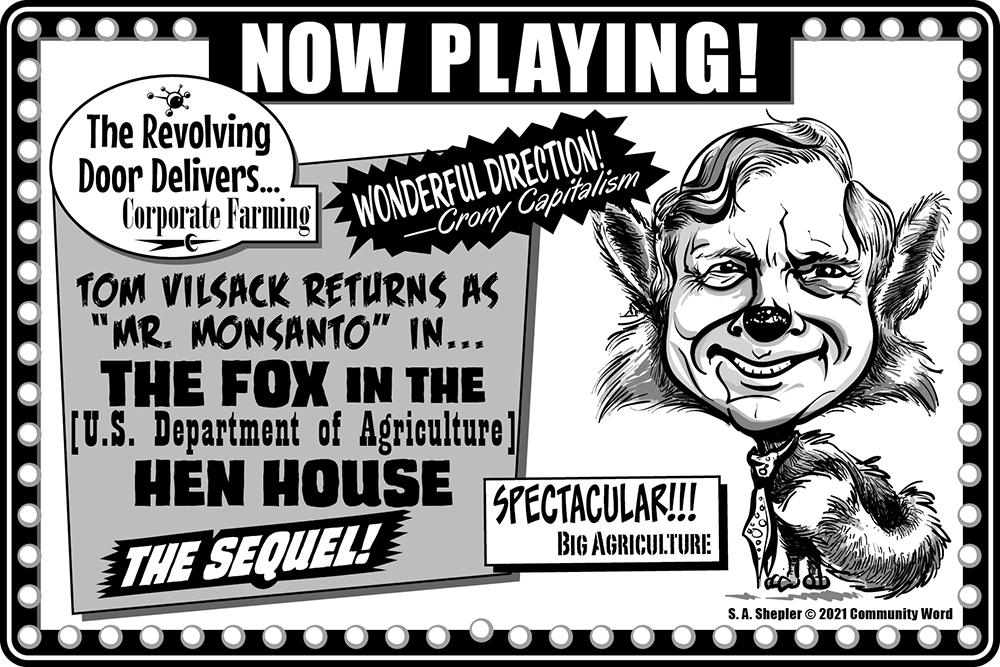 Tom Vilsack is returning to his post as U.S. Secretary of Agriculture. He served in that capacity under President Obama for eight years. Vilsack hails from Iowa, a leading agricultural state with a major focus on industrial corn, soybeans, hogs, cattle, poultry and milk production. He is also the former president and CEO of the U.S. Dairy Export Council, a powerful dairy industry organization.
Tom Vilsack is returning to his post as U.S. Secretary of Agriculture. He served in that capacity under President Obama for eight years. Vilsack hails from Iowa, a leading agricultural state with a major focus on industrial corn, soybeans, hogs, cattle, poultry and milk production. He is also the former president and CEO of the U.S. Dairy Export Council, a powerful dairy industry organization.
Vilsack spoke recently to journalists at a virtual press conference hosted by the National Press Foundation on “Poverty and Inequality in the U.S.”
He acknowledged lots of critical problems but failed to mention the source of these critical problems: the $1.1 trillion food and agriculture industry and the federal farm program that creates many of these issues.
Here’s what he said about the scope of the problem:
- 43 million Americans are on SNAP (Food Stamps);
- 50% of eligible people enroll in the WIC program;
- 71% of the U.S. population is overweight or obese;
- 12% of the U.S. population is food insecure;
- 66% of the U.S. population has at least one chronic disease;
- 44% of the U.S. population has two or more chronic diseases.
Obesity among children is a national security problem with 75% of those between 17 and 24 years old not fit for military service. Diabetes, a multi-billion dollar drain on the U.S. economy, is correlated to nutrition and food insecurity.
“Food insecurity and nutrition insecurity are twin issues,” he said, noting that the food stamp program is in America’s collective self-interest. It is not a handout, not welfare.
“It is in our best interest for kids to be well fed. It’s a collective responsibility,” he said. “We cannot have the levels of obesity, diabetes and chronic diseases. It will cripple everything we try to do.”
He wants to expand government outreach for enrollments to SNAP and WIC. He noted that the food distribution system is a national problem that results in milk being dumped and crops being destroyed.
He expressed support for “sound science” informing USDA programs, but he comes from the world of corporate trade associations and political campaign funding that shapes public policy, undermines the public health and manipulates democracy.
Not said in his talk was any acknowledgement of the $1.1 trillion food and agriculture industry that spends millions lobbying congress and promoting industrial food and production practices. The marketing of industrial food was unmentioned.
Feed the Truth, a nonprofit organization, recently issued a report “Draining the ‘Big Food’ Swamp.”
The report clearly points to industrial food and agriculture as “operating behind the scenes to undermine public health, perpetuate inequality and consolidate power.”
The report states: “Land is poisoned, skies polluted, oceans clogged with trash, and epidemics of obesity and heart disease run rampant because of political choices made in response to an influential industry.
“The food industry seeks to conceal the depth of its influence by funding multiple trade associations that market misleading information under the guise of consumer empowerment while using its vast resources to shape policy. This study unmasks how a handful of the world’s largest food corporations bankroll a few of the country’s largest trade associations to bend our democracy to their will. It does so by analyzing the political influence wielded by 20 of the largest food industry trade organizations that have the highest spending on political campaigns and lobbying, and by highlighting the activities of three of the most powerful groups.”
In the report, Rep. Rodney Davis, R-Ill., made the list of top recipients of campaign money from Big Food, receiving almost $300,000.
The report’s No. 1 recommendation: The federal government must end the “revolving door” between government and industry. The revolving door enables corporate interests to become entrenched in food policy making. Safeguards must be put in place — and enforced—to prevent those who play a major role in determining the fundamental rules that govern our food system from monetizing their time in public service.
Vilsack is in the “revolving door.”

Recent Comments